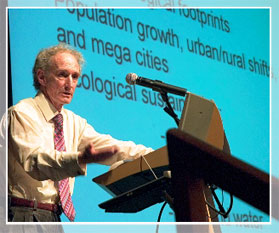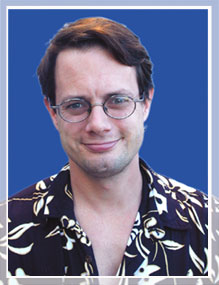In an open letter to G8 Environment Ministers, Lord May (left), the president of The Royal Society, cited UCSB Geography research in his warning that climate change might undermine international efforts to alleviate poverty in Africa:
“To energy and environment ministers who will attend the G8 dialogue meeting on climate change on 1 November:
As you gather to take forward the action plan on climate change from the Gleneagles summit, I urge you to consider some of the latest scientific evidence on the impacts of climate change that has recently emerged and to agree further action to stop the rise in greenhouse gas concentrations in the atmosphere.
Today, a scientific paper has been published in the journal Philosophical Transactions of the Royal Society: Biological Sciences which concludes that climate change, largely caused by a rise in greenhouse gas emissions from human activities, may already be responsible for an increase in drought conditions, and hence for a rise in the risk of famine, in eastern Africa where millions are already at risk of hunger.
The paper by James Verdin of the United States Geological Survey and co-workers presents evidence, collected by the University of California at Santa Barbara, that there has been a drop in rainfall since 1996 in Ethiopia and neighbouring countries, which coincides with a steady increase in surface water temperatures in the southern Indian Ocean.
The researchers point out that this reduction in rainfall is adversely affecting the growth of crops and increasing the number of people who require food aid. The researchers conclude: ‘Already facing a food security emergency, with 8-10 million people at risk, troubling multi-year drying has been observed in recent years, associated with a positive trend in Indian Ocean sea surface temperatures that is affecting countries around the basin.’” See website for full text.
The paper Lord May alludes to is “Climate science and famine early warning” by James Verdin, Chris Funk (right), Gabriel Senay, and Richard Choularton. It presents results from ongoing work being carried out by Chris Funk, Greg Husak, and others in the Climate Hazard Group which is headed by Professor Joel Michaelsen (below). For more on their work, see the June 21, 2005 news article titled “Joel Michaelsen Tackles Climatic Extremes” and the accompanying link to a comprehensive report on the UCSB Climate Hazard Group’s activities.
Lord May concludes his open letter by saying: “The mounting scientific evidence shows that the consequences of global climate change are the biggest single threat facing the world today. The international community needs leadership in the fight against climate change and I urge the G8 nations to meet this challenge.” Our Geography Department is providing some of that leadership. To be cited by a world authority as primary evidence for both the reality and causes of global warming at such a critical time is a major kudo for researchers in our Department. It’s also a tribute to both the talent and the dedication which UCSB geographers apply to their work and to the vision of the Geography Department to “include specialists in all of the major processes that influence the Earth system at human timescales… who are committed to integrating their knowledge with others to solve problems.” Amen.
FYI: The Royal Society, the UK equivalent of the US National Academy of Sciences, is an independent British scientific academy dedicated to promoting excellence in science. It plays an influential role in national and international science policy by supporting developments in science engineering and technology with fellowships, research professorships, and grants. The Society originated as an informal gathering of “natural philosophers” who began meeting in the mid-1640s to discuss the ideas of Francis Bacon. Its official foundation date is November 28, 1660, when 12 of the members met at Gresham College after a lecture by Christopher Wren, the Gresham Professor of Astronomy, and decided to found “a Colledge for the Promoting of Physico-Mathematicall Experimentall Learning.”
Robert McCredie May was awarded a Knighthood in 1996, became a Life Peer in 2001, and was awarded the Order of Merit in 2002. He was Chief Scientific Adviser to the UK Government and head of the Office of Science and Technology from 1995 to 2000, when he started his 5-year term as the president of the Royal Society. A physicist by training, he has won numerous international awards, including the Royal Swedish Academy of Science’s Crafoord Prize (the equivalent of a mathematics Nobel) for pioneering ecological research in the theoretical analysis of the dynamics of populations, communities, and ecosystems. He currently holds joint professorships in the Department of Zoology, University of Oxford, and in Imperial College, London, and is a Fellow of Merton College, Oxford.



.jpg)
